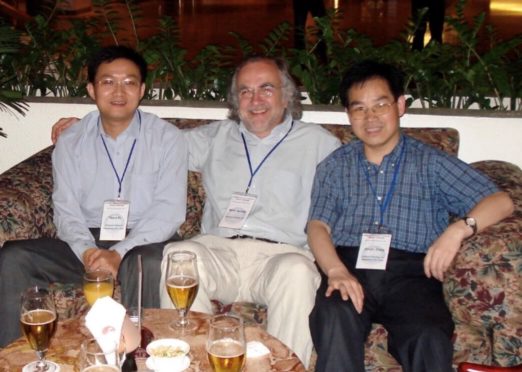A north-east geologist has been honoured for more than four decades of work in China.
Professor Martin Menzies has watched China transform from a closed society in the 1980s into a global superpower, and has now been given a prestigious award for his contribution to science there.
He has been awarded the China Medal for International Collaboration, following 40 years of work with geology students in Guangdong Province.
The 70-year-old grew up in Banchory, and yesterday said he was indebted to his old geography master, Jack Ewan, who had a rock and mineral collection in his classroom.
Prof Menzies, emeritus in volcanology at the Royal Holloway University of London, described how his passion for science had helped establish new collaborative research teams and break down cultural barriers.
He said: “I had an early fascination with my grandfather’s antique atlas from the 1800s which got me interested in geography and then geology in the first place.
“My father was a chemist who worked for Crookes Laboratories in London, then ran pharmacies in Banchory, so science in the family got me intrigued with the subject.”
Prof Menzies studied geology at Aberdeen University and graduated in 1971, going on to do a PhD at Cambridge before moving to USA with his wife, Lesley Hunter.
Since then he has travelled the world and explored volcanoes and super-volcanoes.
But his life has revolved around China – his daughter, Marin, has taught English in Shanghai for the last five years – and he has witnessed remarkable changes.
He said: “In 1981, China was ‘closed’, but with a special day pass, you could visit from Hong Kong. At that time, there were lots of checks in passports and a limited itinerary.
“Shenzhen (near Hong Kong) was a small village with corrugated iron-roofed shops, muddy roads, and where travel was incredibly slow, and there were no reliable flights.
“In 1992, Beijing streets were full of bikes and pedestrians, and foreigners had a special currency which could only be used in tourist shops. Train travel was improving, but airlines still had a long way to go.
“However, now in 2019, China is full of ‘westernised’ cities and Shenzhen is packed with skyscrapers and the most modern cars and all the cities are connected by high-speed trains, motorways and flourishing national airlines. Tourists use the local currency – the yuan – and can move through the country with ease.
“There has been remarkable progress in many areas, including science and technology and I have been privileged to have seen China develop in so many ways.
“I’m honoured and humbled by my Chinese colleagues appreciating my role in the internationalisation of our science. Decades of scientific collaboration have led to long-lived family friendships and these are special.”
The professor still returns to Deeside every year and has maintained links with colleagues in Scotland. He continues to work closely with students across the world and believes it has never been more important to encourage youngsters to take an interest in STEM subjects.
He added: “Research is vital for our survival. Science, technology, engineering and medical advances influence every part of our lives.
“Think about STEM and how it affects so many things: wi-fi, smartphones, global travel, wind power, solar power, renewables and cures for many illnesses.”
Prof Menzies will receive his award in Guangdong later this year.
